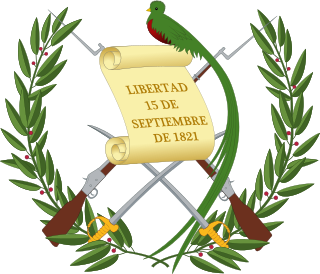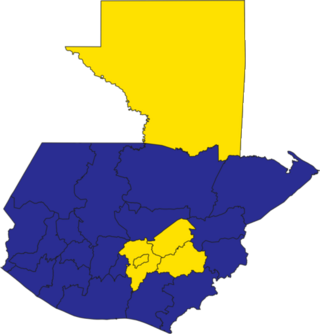
Guatemalan Christian Democracy was a political party in Guatemala. A moderate, reformist and anti-Communist party, it was a member of Christian Democrat International.

General elections were held in Guatemala on 1 March 1970. No candidate received over 50% of the vote in the presidential election, resulting in Carlos Manuel Arana Osorio being elected by Congress on 21 March by a vote of 37 to 17. The National Liberation Movement–Institutional Democratic Party alliance also won the Congressional elections. Voter turnout was 53.82% in the presidential election and 53.26% in the Congressional elections.

General elections were held in Guatemala on 5 March 1978. No candidate received more than 50% of the vote in the presidential election, resulting in Fernando Romeo Lucas García being elected president by Congress with 35 votes, amidst an opposition boycott. The Congressional elections were won by the National Liberation Movement.

Constitutional Assembly elections were held in Guatemala on 1 July 1984. Although the Guatemalan Christian Democracy received the most votes, an alliance of the National Liberation Movement and Nationalist Authentic Centre emerged as the largest bloc with 23 of the 88 seats. Voter turnout was 78%.

General elections were held in Guatemala on 3 November 1985, with a second round of the presidential elections taking place on 8 December. The presidential election resulted in a victory for Vinicio Cerezo, who had received $650,000 towards his campaign from media owner Remigio Ángel González. The Congressional elections resulted in a victory for Cerezo's Guatemalan Christian Democracy, which won 51 of the 100 seats. Voter turnout was 69.3%.

General elections were held in Guatemala on 12 November 1995, with a second round of the presidential elections held on 7 January 1996. Álvaro Arzú of the National Advancement Party won the presidential election, whilst his party also won the Congressional elections. Voter turnout was 46.8% on 12 November and 36.9% on 7 January.

General elections were held in Guatemala on 19 January 1958 after the 1957 elections were nullified. After no candidate received 50% or more of the national vote, Miguel Ydígoras Fuentes was elected President by Congress on 12 February, whilst an alliance of the National Democratic Reconciliation Party, Nationalist Democratic Party, the Nationalist Liberal Party, the Democratic National Association and the National Anti-Communist Front won 40 of the 66 seats in Congress.

Parliamentary elections were held in Guatemala on 16 December 1959, in order to elect half the seats in Congress. Voter turnout was just 44.91%.

Parliamentary elections were held in Guatemala on 3 December 1961, in order to elect half the seats in Congress. Following the election, the National Democratic Reconciliation Party-National Democratic Movement-Democratic Unity Party alliance held 50 of the 66 seats. Voter turnout was just 44.48%.

Constitutional Assembly elections were held on 24 May 1964. The Movement of National Liberation and the Revolutionary Party both won ten seats, although sixty members were appointed by the military government.

General elections were held in Guatemala on 20 October 1957. Miguel Ortiz Passarelli won the presidential election. However, the elections were nullified on 23 October 1957 following protests against electoral fraud.

Parliamentary elections were held in Guatemala on 18 December 1955. The result was a victory for the National Democratic Movement, which won 58 of the 66 seats in Congress.

Parliamentary elections were held in Guatemala between 24 and 26 January 1947 in order to elect half the seats in Congress. The Revolutionary Action Party won a plurality of seats.

Parliamentary elections were held in Guatemala on 3–5 November 1944 to elect members of the Congress. The result was a victory for the United Front of Political Parties and Civic Associations (FUPP), which won all 76 seats. The FUPP was an alliance of the National Democratic Front, the Popular Liberation Front, the Central Democratic Party, the Social Democratic Party, the National Renovation Party and the National Vanguard Party.

Presidential elections were held in Guatemala between 17 and 19 December 1944. The October Revolution had overthrown Jorge Ubico, the American-backed dictator, after which a junta composed of Francisco Javier Arana, Jacobo Árbenz and Jorge Toriello took power, and quickly announced presidential elections, as well as elections for a constitutional assembly. The subsequent elections were broadly considered free and fair, although only literate men were given the vote. Unlike in similar historical situations, none of the junta members stood for election. The front-runner was the philosophically conservative University professor Juan José Arévalo, of the National Renovation Party. His closest challenger was Adrián Recinos, whose campaign included a number of individuals identified with the Ubico regime. The ballots were tallied on 19 December and Arévalo won in a landslide with 86.25% of the vote, receiving more than four times as many votes as the other candidates combined. The Constitutional Assembly elections took place on 28–30 December, with the United Front of Arevalist Parties winning 50 of the 65 seats.

General elections were held in Guatemala between 6 and 8 February 1931. In the presidential election Jorge Ubico was elected unopposed, after the remaining sector of the old Liberal Party did not object to his candidacy, whilst the Conservative Party was too disorganised and discredited from the Lázaro Chacón González era to put forward a candidate. Ubico's Progressive Liberal Party, formed by a union of the two wings of the divided Liberal Party also won the parliamentary election unopposed.

General elections were held in Guatemala on 5 December 1926. The presidential election resulted in a victory for Lázaro Chacón González, who received 88.6% of the vote. Whilst the elections were rigged, the Progressive Liberal Party did manage to win some seats in the Congress.

Constituent Assembly elections were held in Honduras on 20 April 1980. In July the Assembly elected Policarpo Paz García as president.
The 1993 Guatemala constitutional crisis took place in 1993 when then President Jorge Serrano Elías attempted a self-coup or autogolpe. On Tuesday May 25, 1993, Serrano illegally suspended the constitution, dissolved Congress and the Supreme Court, imposed censorship and tried to restrict civil freedom.

A constitutional referendum was held in Guatemala on 30 January 1994. It followed a constitutional crisis and an attempted self-coup on 25 May 1993 by President Jorge Serrano Elías. Among the reforms was a plan to reduce the parliamentary term of the current government. The changes were approved by 83.9% of voters, although voter turnout was just 15.9%.






